Ensuring that parents and carers understand the benefits of music making for young mental health service users by Paul Carroll (Quench Arts' Wavelength Project Music Leader)

One of the conclusions I came to in my last Youth Music post, which was about making people feel comfortable in their first group music-making session (http://network.youthmusic.org.uk/learning/blogs/nicbriggs/putting-people...), was that we are trying to encourage people who attend to continue coming in the longer term so that they can access the full benefits of the project. To do this, we can make sessions fun and we can motivate participants by helping them see their own potential and progression within a session, but we can also consider how we might limit the challenges for them in getting to the venue due to transport, or even motivational and confidence issues.
Young people with additional needs may rely on their parents or carers to bring them to sessions so by keeping parents/carers on side, we hope that they feel that it is worth making the trip each time, even it is a distance and/or an evening or weekend. At the same time, parents can advocate for the music project if they understand the benefits, again helping motivate the young person to attend as much as possible. In addition, parents and carers can help reinforce the benefits of the project. As session facilitators, we can congratulate, praise and celebrate as much as we like in sessions for up to the length of the session, typically between one and three hours. Then we may not see the participants for a few days so just think about all that additional time for acknowledgement over the course of a month! Parents/carers can help here if they are discussing how the project is going and telling other family members how well things are going.
Now, we’re not teachers, but I find that a series of creative music sessions do progress much faster if the participant considers their work-in-progress in some way between sessions. Parents can help with encouraging the young person to do so, perhaps not through insisting a young person practise but more indirectly through praise and acknowledgement of how well they’ve been doing in sessions so far. For example, if a person turns up for the first time with some lyrics already written, which is more common than you might think, it is possible to write a complete song with melody and chord progressions well within an hour-long session. If you are holding a rehearsal for a gig and members of the group have been practising at home, then things can fall into place very quickly. When young people can see that the music-making process is working, we hope that they feel pleased with themselves and are even more motivated to persevere with music as a pastime or even a career.
So, at Wavelength how do we ensure that parents and carers understand the benefits of music-making for young mental health service users? Firstly, we welcome parents and carers to visit sessions. This year we have one parent who attends fully to support his daughter and has almost become a by-proxy participant. An experienced drummer, he takes part in all activities and in doing so, accompanies his daughter on her creative journey, which in the case of this family is a wonderful thing. For other parents it is more appropriate for them to give the young person their own space to explore their music. For those who wait in the same building, there are free drinks in the kitchen whilst the young participant(s) are making music nearby. Here, parents/carers have the opportunity to have informal chats with other parents and staff and also formal advice about anything from carers’ benefits to available services from Helen, the project’s Support Worker provided by Home Group (https://www.homegroup.org.uk/). Then, towards the end of group sessions, we invite everyone to come in and hear what the young people have achieved in a few hours, usually a new song or two.
Secondly, each year the young people have the opportunity to perform their music. We also produce a nicely packaged CD recording of the whole year’s participants’ songs. So we try and make the live songs and recordings sound as professional as possible through a well-planned creation and rehearsal schedule and the use of decent microphones and music software such as Apple GarageBand, Logic, Ableton Live and Steinberg Cubase.
I referred you to my last post about making the young people feel at ease when they start the project - what we do to make them feel comfortable we try and do for parents too. I believe that if parents/carers feel that their young people are working with well-equipped musicians who care, then parents/carers will recognise the benefits of the project earlier on, reinforce benefits for the young people and ensure that they keep coming back.
